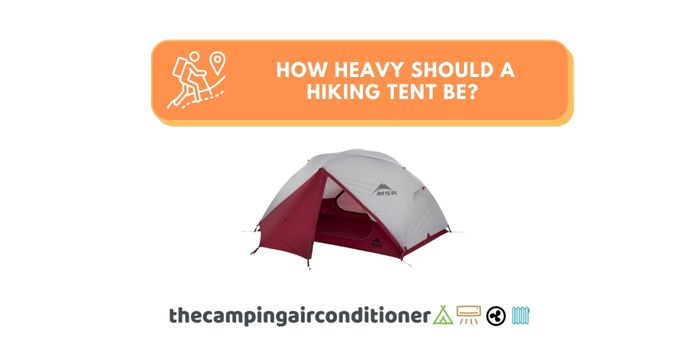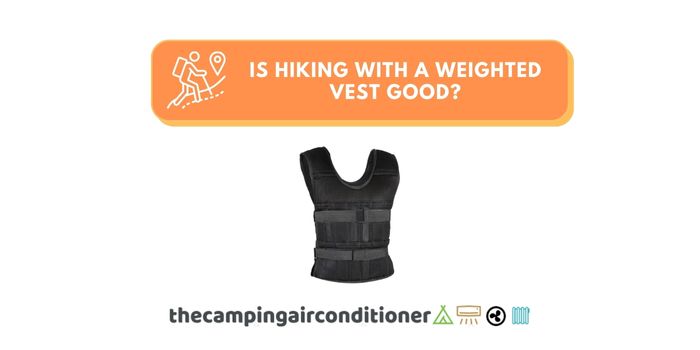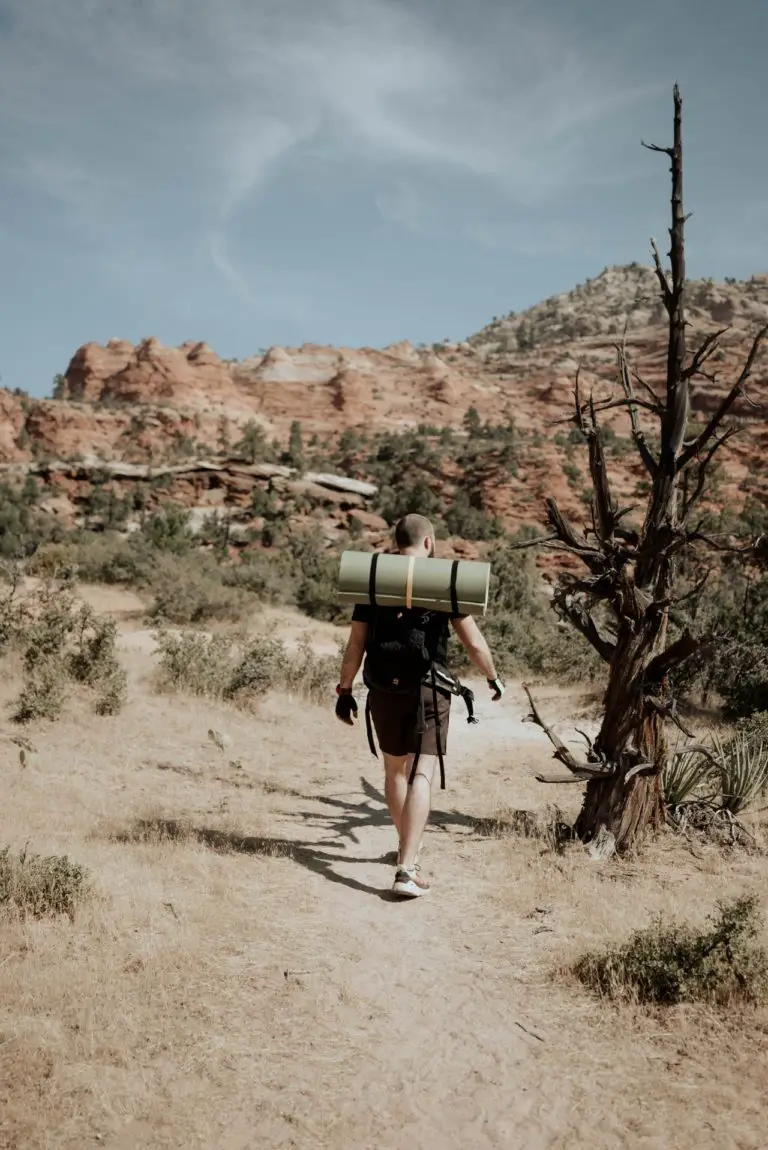How Heavy Should a Hiking Tent Be? Less than…
When you go out hiking, your hiking gear should be as light as possible. This is when you’re out hiking, you constantly have to bring everything with you no matter where you go. And as a result of that, even just a few lbs extra can be a huge difference in your hiking experience.
On my first hiking trip, I sort of just brought what I thought would be useful, and went with that only to regret the weight of my gear very very early into the trip. My hiking tent was the biggest issue though as it was heavy. I mean it was at least 10 lbs. So, that got me thinking…how heavy should a hiking tent be?
From personal experience and a ton of research, I’ve found that a hiking tent (even if it’s for 2 people) shouldn’t be heavier than 6 lbs. Anything over 6lbs is totally unnecessary and will just add extra weight to your hiking gear.
In this article, I will go over in more detail how heavy your hiking tent should be, explain the different tent weight variations, show you how to pick the right tent for your needs, and near the end, I’ll show you two models that I would personally buy if I needed a brand new hiking tent.

By the way, The Camping Air Conditioner is sponsored by readers. When you buy through one of our links, we may earn an affiliate commission at no extra cost to you.
How Heavy Should a Hiking Tent Be?
When deciding which tent to use when hiking, it’s very important to consider the weight. Ideally, the tent should be fairly lightweight (between 4 and 6 lbs) and easy to carry as you don’t want the tent and your backpack to weigh you down on your journey.
And while it might be nice to have a large and spacious tent for the hot summer weather, it’s not a good choice when you’re hiking as you will not only have to carry it everywhere but also take it apart and put it up (which takes time) every time the night falls.
For a single person hiking tent, I personally don’t think you should go for anything over 4 lbs, and for a tent that can accommodate two hikers at once, 6lbs. This gives you enough space in your backpack to add more essentials without weighing you down too much.
Packed, Trail, and Fast Fly Weight – What’s the Difference?
If you’re shopping for tents, it’s important to pay close attention to the weight. However, there are many tents that display their weight in three variations: packed, trail, and fast fly weight.
When you see a tent’s packed weight, this is the entire weight of the tent with all its accessories. Aside from the essentials, this includes extra guylines, repair kits, the user manual, stakes, and more. This is the heaviest iteration of the tent and it’s ideal for longer camping trips that don’t involve much hiking.
While the packed weight of the tent includes everything you need, there are many components that aren’t essential when on the trail. So, the trail weight of the tent only refers to how much it weighs when you pack the tent, the rainfly, the poles and the footprint.
If you’re looking to pack as lightly as possible, there’s trail (minimum) weight. This only refers to the fly, poles, and the footprint. When packing fast fly weight, you won’t be bringing the tent canopy with you. So, while this is the lightest option, it’s also the most incomplete and forgoes a lot of accessories you might need.
| Weight | Description | Ranking |
| Packed | Tent’s weight with all accessories (i.e. repair kits, guy lines, poles, etc.) | Heaviest |
| Trail | Includes the tent body, rainfly (if existent), and poles | Light |
| Fast Fly | Tent body, poles, and accessory footprint | Absolute minimum weight |
The reason you want to pack light with your tent is because these aren’t the only things you’re bringing on the trip. On top of the tent, there’s a high chance you will have to bring gear like a camping stove, a portable coffee maker, and more, so you don’t want your tent to weigh you down too much.
How to Choose a Good Tent for Hiking
If you’re looking for a good hiking tent, there are tons of options on the market. However, all of these choices makes it hard to choose the right one for your needs.
Even with a definitive list of the best hiking tents, if you don’t know what to look for, you’ll end up having a pretty hard time finding a tent suitable for your needs. So, here are a couple important things to consider that will make it easier for you to choose the right tent for hiking.
#1 – One vs. Two vs. Three-Person Tents
The first decision you have to make is how many people you plan on accommodating in the tent. When hiking, I recommend using a one person tent. This is because these are the lightest tents available and will be much easier to carry when walking the trail.
When you carry a two or three person tent with you, then one person will end up having to carry the heaviest weight, which is going to be the tent. If you’re hiking with a group, it’s best to distribute the load properly to ensure no one gets left behind or has to carry too much weight on their shoulders.
So, even when hiking with multiple people, it’s best to let one person carry a solo tent each as opposed to brining multiple-person tents that can weigh you down.
#2 – Space
The next thing to consider is the actual living space in the tent. While you want to keep things as light as possible, it’s also important that you have ample space inside where you can feel comfortable.
If you want to be able to stand up straight even if you’re a tall person, check out these 5 tents.
#3 – Weight
Lastly, you want a lightweight tent that’s not over 6 lbs in weight. There are quite a few solo camping tents out there that are actually pretty heavy. So, even when shopping for smaller tents, make sure to pay attention to the weight as small tents don’t always mean that they’re going to be lightweight.
The Best Lightweight Tents for Hiking
When I researched the market for the best lightweight tends for hiking, I came across quite a few good options, but these two below really stood out to me.
OneTigris Tangram – Suitable for 2 Hikers
I usually advise against two-person tents for hiking, but if you must bring a two-person tent, this is one of the best options. While it’s a bit larger than other options, it’s still very lightweight and easy to bring on a camping trip.
It’s also made of high-quality, waterproof materials. So, you can rest assured that this tent can keep you safe on your camping trips for a long time coming during the summer, spring, and fall.
- Suitable for up to 2 hikers
- Made out of waterproof materials
- Lightweight, compact, and easy to carry around
- Fast and easy set up
- Not suitable for use during the winter
- Can easily accommodate 2 people at a time
- Weighs just under 5lbs
- Waterproof
- When packages, tent measures 4.92 x 4.72 x 8.66 inches
Winterial Hiking Tent – Suitable for 1 Hiker
When it comes to hiking tents, there aren’t many options that compete with the Winterial hiking tent. This is a lightweight and sleek tent that is very convenient and easy to bring on hiking trips.
It’s really lightweight (weighing at just 4 lbs), so you won’t have to worry about the tent weighing you down. And even if it’s light, it’s really durable, so it will last you years if you take care of it right, otherwise, it the tent can get moldy and unsuitable for use.
Granted, this tent is pretty pricey. But considering all the cool features you get from it, the price is very much worth it.
On top of that, this tent packs really compact, making it a suitable option if you plan on bringing other essential hiking gear such as a mini camping air conditioner.
- It can be used during the summer, spring, or fall
- Quick and easy to set up
- Weighs just 4 lbs
- Very compact and easy to carry
- Not suitable during the winter
- Suitable for one person
- It can be used during the spring, fall, and summer
- Quick and easy set-up
- Weighs just 4lbs
Conclusion
Hiking is a whole lot of fun. But if you plan on camping out during your hiking trip, it’s important to bring the right tent.
The best hiking tents are lightweight, easy to setup, and durable. So, make sure to shop for smaller and lightweight tents for your hike to make for the most comfortable experience.








